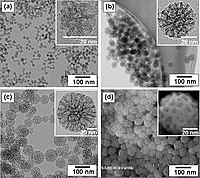
Photo from wikipedia
Quercetin (Qu, 3,5,7,3', 4'-pentahydroxyflavanone) is a natural polyphenol compound abundantly found in health food or plant-based products. In recent decades, Qu has gained significant attention in the food, cosmetic, and… Click to show full abstract
Quercetin (Qu, 3,5,7,3', 4'-pentahydroxyflavanone) is a natural polyphenol compound abundantly found in health food or plant-based products. In recent decades, Qu has gained significant attention in the food, cosmetic, and pharmaceutic industries owning to its wide beneficial therapeutic properties such as antioxidant, anti-inflammatory and anticancer activities. Despite the favorable roles of Qu in cancer therapy due to its numerous impacts on the cell signaling axis, its poor chemical stability and bioavailability, low aqueous solubility as well as short biological half-life have limited its clinical application. Recently, drug delivery systems based on nanotechnology have been developed to overcome such limitations and enhance the Qu biodistribution following administration. Several investigations have indicated that the nano-formulation of Qu enjoys more remarkable anticancer effects than its free form. Furthermore, incorporating Qu in various nano-delivery systems improved its sustained release and stability, extended its circulation time, enhanced its accumulation at target sites, and increased its therapeutic efficiency. The purpose of this study was to provide a comprehensive review of the anticancer properties of various Qu nano-formulation to augment their effects on different malignancies. Various targeting strategies for improving Qu delivery, including nanoliposomes, lipids, polymeric, micelle, and inorganic nanoparticle NPs, have been discussed in this review. The results of the current study illustrated that a combination of appropriate nano encapsulation approaches with tumor-oriented targeting delivery might lead to establishing QU nanoparticles that can be a promising technique for cancer treatment.
Journal Title: Current medicinal chemistry
Year Published: 2023
Link to full text (if available)
Share on Social Media: Sign Up to like & get
recommendations!